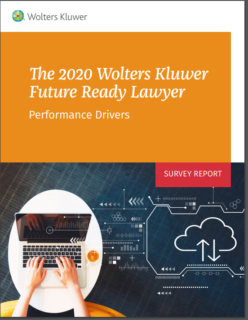The financial crisis of 2007 triggered a convulsion in the legal industry which continues to offer aftershocks exacerbated by “economic, demographic, regulatory, technology and competitive demands.” And then as we know, the COVID-19 pandemic triggered new a new crisis. Wolters Kluwer was analyzing the legal marketplace back in January 2020. Today they are releasing the survey results in the 2020 Wolters Kluwer Future Ready Lawyer: Performance Drivers and Change in the Legal Sector” which was designed “to assess the future-readiness and resilience in the legal sector.”
the COVID-19 pandemic triggered new a new crisis. Wolters Kluwer was analyzing the legal marketplace back in January 2020. Today they are releasing the survey results in the 2020 Wolters Kluwer Future Ready Lawyer: Performance Drivers and Change in the Legal Sector” which was designed “to assess the future-readiness and resilience in the legal sector.”
The survey gathers feedback from an international group of 700 legal professionals working in law firms and as in-house counsel.. The full survey is available at this link.
The report is 29 pages long but is full of graphs and data illustrating various trends as well as the disconnects between law firms and in-house counsel priorities. Both law firms and in house counsel share an awareness of technology as a critical success factor but the majority of both organization types are f ailing overcome obstacles to implementation.
I spoke with Dean Sonderegger, head of Wolters Kluwer Legal & Regulatory U.S about the survey results. Sonderegger predicts that the COVID pandemic will accelerate all the trends identified in the survey.
Top Trends and Readiness
Lawyers identified trends expected to impact their organizations over the next three years. Technology topped the list. The top trends expected to have the most impact are:
- Increasing Importance of Legal Technology – 76%
- Meeting Changing Client / Leadership Expectations – 74%
- Emphasis on Improved Efficiency / Productivity – 73%
- Ability to Acquire and Retain Talent – 73%
- Coping with Increased Volume and Complexity of Information – 72%
The Gap Between Awareness and Readiness
The overwhelming majority of respondents indicated that their organizations Fewer than one-third of respondents reported they were very prepared to address any of them. Change Management & Leadership Resistance to Change is reported as the biggest barrier to implementing change for both corporate legal departments (65%) and law firms (53%).
The Changing Law Firm Even though law firm respondents acknowledge the importance of technology – the majority of respondents don’t see their law firms responding appropriately.
- 67% of law firms said they are Investing in New Technology to Support Firm Operations and Client Work.
- 60% plan to increase their technology budget over the next three years.
- 30% believe their firm’s Leadership Understands Transformational Technologies Benefits;
- 29% believe they are very prepared when it comes to Understanding Technology Solutions Available; 27% are very prepared to Use Technology to Be More Productive;
- 26% are very prepared to Use Technology to Improve Client Services;
- 24% say their staff is Capable of Leveraging Technology effectively.
- 21% say their firm is very prepared to Recruit / Retain the Technology Staff needed to effectively support their firm.
- 59% cite Artificial Intelligence is the technology with the biggest impact in the next three year
- 22% understand AI very well.
Sonderegger encapsulates the key “take-aways” in the press release. “This year’s survey results reaffirmed the importance of technology to the performance and profitability of legal professionals, but it also showcased the challenges that still exist for those who want to drive innovation forward within their organizations. The survey provides critical insight into the drivers that are transforming the legal profession.”
Download the full survey at this link.